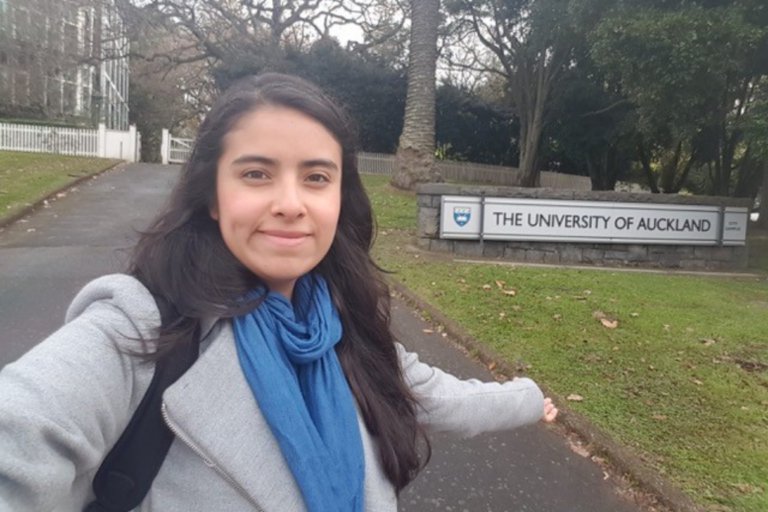
Ask any law graduate, and they’ll tell you that studying law is a long, arduous, and challenging journey — mentally, emotionally, and physically.
And that’s just the qualification you need to practise law in one country.
If you want to become a lawyer in more than one country, you’ll need to study and take more exams.
Maria Nieto, a qualified Mexican lawyer currently working as a Senior Solicitor with Foreign Qualifications at Simpson Grierson, knows this well.
Her journey to one of New Zealand‘s leading full-service commercial law firms was possible, thanks to completing her LLM (short for Masters of Law) — specialising in Corporate and Commerical Law and her previous experience in her home country.
Nieto aspires to become a solicitor and barrister of the New Zealand and has decided to complete an “overseas qualification assessment” with the New Zealand Council of Legal Education (NZCLE).
“Some mistakenly refer to this process as the conversion of the [law] degree,” she told Study International. “You’re not converting your title (say from Mexico to New Zealand); you’re accrediting the requirements to become a local lawyer.”
We caught up with the law graduate to learn more about what sparked her interest in becoming a lawyer, her time in Mexico, as well as the process of becoming a foreign lawyer in New Zealand:

Nieto took part in an international exchange programme with the University of International Business and Economics. Source: Maria Nieto
Was studying law your childhood ambition?
From a very early age, I knew I wanted to study something related to business. I wanted to be part of the corporate world. I remember watching “Dragons’ Den” as a teenager and being thrilled by the intense negotiations between investors and entrepreneurs.
I also watched many episodes of “The Apprentice” and similar shows. I always wanted to be part of the team negotiating transactions and developing new businesses.
After graduating from high school, I started studying economics. Two years later, I realised that I was not enjoying it and that something was missing.
I felt baffled at that time, so my mother — a criminal lawyer — suggested attending a class in law school.
At the time, I was not interested in becoming a lawyer since my idea of a lawyer has nothing related to business.
Much of this could be because I grew up learning a lot about criminal law because of my mother.
Still, I followed her advice and attended a contract law class. Something in that class made me feel excited — I loved the idea of drafting a contract to document a transaction and the detail that was involved in it.
What was it like studying law in Mexico?
In 2010, I started studying law at the National Autonomous University of Mexico (UNAM). It’s a vibrant university — the largest in Latin America — and highly regarded in the Spanish-speaking world.
The Faculty of Law at UNAM is home to over 13,000 students and a diverse group of professors, including Supreme Court judges, public servants, national researchers, and legal specialists in a wide range of subjects.
Throughout my five years at UNAM, I covered a wide range of subjects, including civil law, criminal law, constitutional law, public law, theory of law, tax law, commerce law and more.
In my final two semesters, I specialised in corporate and commercial law.
As part of my last semester, I had the incredible opportunity to participate in an exchange programme at the University of International Business and Economics (UIBE) in Beijing, China.
To graduate from UNAM, I had to prepare and defend a thesis, which is the final step to becoming a lawyer in Mexico.
My thesis, titled “Clearing derivatives: Legal analysis and proposal for the exclusive use of central clearing,” earned me graduation with honours in April 2016.

Nieto during her graduation ceremony at the University of Auckland. Source: Maria Nieto
What motivated you to practise law in New Zealand?
New Zealand offers a high quality of life, a safe environment, and stunning natural landscapes.
Additionally, UOA’s LLM programmes and the availability of scholarships for international students made it an attractive destination for furthering my legal education.
Plus, the opportunity to work in a different legal system, gain international experience, and contribute my expertise in both Mexican and New Zealand law were compelling reasons to practice in New Zealand.
Walk us through your journey to becoming a lawyer in New Zealand.
While studying, I started working at Coca-Cola FEMSA (a bottler of the Coca-Cola system in Mexico). I was part of the legal team responsible for the banking and finance affairs of the company.
Upon graduation, I worked at Deloitte as a legal consultant and then at RGR Abogados — a Mexican commercial law firm — as an associate.
In July 2018, I moved to New Zealand to pursue an LLM in Corporate and Commercial Law at the University of Auckland.
Initially, I had no plans to live in the country permanently, but that changed after attending several workshops and programmes at the University of Auckland.
After completing my LLM, I started working as a Solicitor with Foreign Qualifications at Simpson Grierson.
While foreign lawyers could provide legal services without needing a practising certificate issued by the New Zealand Law Society (NZLS), there are some restricted areas of work.
To call myself a lawyer in New Zealand with no restrictions, I needed to go through a process called “overseas qualification assessment” with the New Zealand Council of Legal Education (NZCLE).
A big reason why I’m doing this is because I’ve decided to live permanently in New Zealand.
I want my clients to be confident that I have sufficient local legal knowledge to provide high-quality service. As an added value, I can offer my Mexican law expertise and provide legal advice in Spanish.
I started this process in 2020 and enrolled to study the first paper a year later.
At the Auckland University of Technology, I am in the midst of completing seven papers for the overseas qualification assessment, which can take up to several years.

Nieto (pictured on the left) together with her husband in Mexico City at the National Autonomous University of Mexico, where she started studying law. Source: Maria Nieto
Has your international background (such as pursuing an international exchange programme or an LLM in New Zealand) helped you in your career?
My time as an international student in countries like China, New Zealand, Malaysia, Mexico, Italy, and Thailand has significantly enriched my legal journey.
It broadened my perspective and deepened my understanding of the business world and how lawyers operate in different jurisdictions.
Studying overseas provided me with insights into the expectations, cultural distinctions and communication styles that vary from one jurisdiction to another.
This knowledge is invaluable in my legal practice, as I know how to effectively engage with counterparts from diverse regions, backgrounds and cultures.
It also allows me to understand the tone and approach that resonates with individuals from different cultural backgrounds.
Beyond this, my international background has been a source of comfort and confidence for my clients.
They feel more at ease knowing that I am experienced in dealing with counterparts from around the world, which enhances the quality and effectiveness of the legal services I provide.
It’s a testament to the value of cross-cultural legal expertise in today’s globalised business landscape.
What were three challenges you faced as an international student? How did you overcome them?
One of the challenges was managing the financial side of studying abroad. Tuition fees and accommodation costs can be quite daunting.
However, I was fortunate to receive a scholarship that significantly eased the financial burden, allowing me to focus on my studies and career development.
Another challenge was the language barrier. English is not my native language, which initially made me feel somewhat intimidated.
That said, through persistent effort, practice, and the support of my classmates, I gained confidence in my language skills. This helped me excel academically and professionally.
Like most international students, I struggled with being far away from family and friends — not seeing them regularly was emotionally challenging.
Nevertheless, I found solace in the fact that my journey made them proud and inspired others.
The sacrifices made to pursue my legal career away from home were ultimately worth it, as they opened doors to new opportunities and enriched my personal and professional lives.

The law affects various parts of our lives, which reflect the wide range of industries law graduates can venture into. Source: AFP
How can law students identify the practice area they wish to venture into? What should law graduates consider when deciding to practise in a different jurisdiction?
Law is a versatile profession. You can work anywhere you want and enjoy what you do every day of your life.
All industries, companies, governments, non-profit organisations and other entities need legal advice.
I’d suggest engaging in mentoring programmes where law students can get advice and insights from people in different industries and jobs.
Try getting in touch with people in various industries and do your research on what legal positions are available in the industry you are interested in.
If law graduates intend to practise in a different jurisdiction, they should align their skills and interests with a practice area.
Some areas, like commercial and intellectual property law, are more transferable between jurisdictions due to their universal nature.
In this, they should research local legal requirements.
Recognise that certain areas of law, such as commercial and IP law, are often more adaptable to various jurisdictions, whereas fields like criminal or civil law may have jurisdiction-specific nuances.










